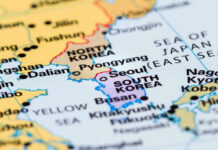Gunmen assaulted the Rucalhue hydroelectric project in Chile, sparking international concern and highlighting tensions with Indigenous communities along the Biobio River.
Quick Takes
- Assailants destroyed trucks and equipment at the $350 million Rucalhue project.
- China denounces the violence, pledging cooperation with Chile’s investigation.
- Chilean officials label the attack as a terrorist act.
- Local Indigenous groups oppose the project due to environmental concerns.
Attack on Rucalhue Hydroelectric Project
In a significant development, gunmen attacked the Rucalhue hydroelectric plant, a site owned by China International Water and Electric Corporation (CWE) through Rucalhue Energia Spa. The assault, targeting a location 550 kilometers south of Santiago, led to the destruction of 45 trucks and critical earth-moving equipment. Two security guards suffered injuries during the attack. Chilean Security Minister Luis Cordero described the incident as “of a terrorist nature.”
The attackers set fire to vital construction machinery and vehicles, raising alarm among the stakeholders. “Proceeded to burn all the equipment there was at the site,” police chief Renzo Miccono confirmed, acknowledging the level of devastation. The attack continues to disrupt progress on the project, estimated at $350 million, with assessments underway to gauge the total damage cost.
Local Opposition and International Concerns
The Rucalhue project, situated along the Biobio River, faces strong opposition from Indigenous communities who argue that the construction threatens the environment. These community protestors have previously made their stance clear through demonstrations. A lawsuit put forth by a subsidiary of China Three Gorges Corporation targets several young activists accused of threatening company officials and setting up camps in protest.
“The complaint was filed after the eviction of young people who had set up a camp,” stated Eduardo Gaspar Soto Delgado on behalf of Rucalhue Energía SpA. Legal actions underscore the growing tensions and highlight the complexities tied to implementing foreign-backed projects in regions advocating for environmental and cultural preservation.
This lawsuit, deemed admissible last December, accuses local opponents of crimes ranging from simple threats to robbery with intimidation. Project developers continue calling for actions “against those responsible,” signaling ongoing legal battles aimed at suppressing organized protests.
Global Response and Collaboration Efforts
China’s foreign ministry strongly condemned the attack, emphasizing their eagerness to cooperate with Chile to pursue those responsible. “The Chinese side… is willing to closely work with the Chilean side to carry out relevant investigations and follow-up actions,” confirmed spokesman Guo Jiakun. While the incident has sparked international dialogue, it also increases the urgency for addressing security measures for foreign investments in Chile.
Ongoing investigations aim to illuminate the motivations behind the attack and increase security at the site. As Chile navigates relationships with international partners amid growing local resistance, the project represents both a challenge and an opportunity to balance development with cultural and environmental considerations.
Sources:
- https://thepeninsulaqatar.com/article/21/04/2025/gunmen-attack-chinese-owned-power-plant-site-in-chile
- https://www.business-humanrights.org/en/latest-news/chile-subsidiaria-de-china-three-gorges-corporation-present%C3%B3-una-querella-contra-j%C3%B3venes-que-se-oponen-a-proyecto-hidroel%C3%A9ctrico/
- https://insiderpaper.com/gunmen-attack-chinese-owned-power-plant-site-in-chile/











